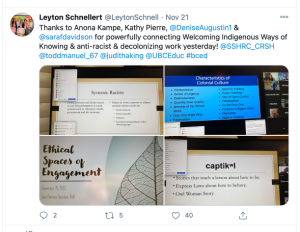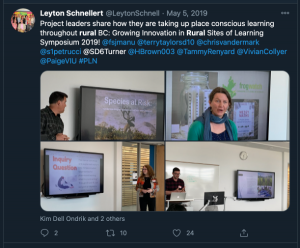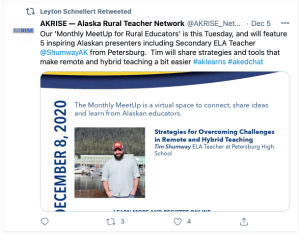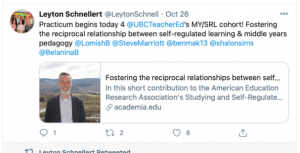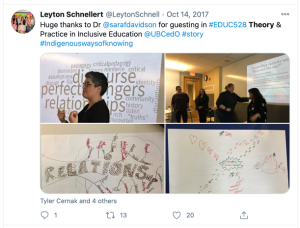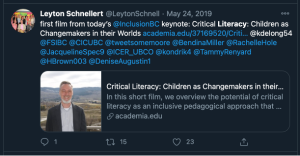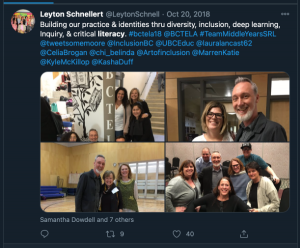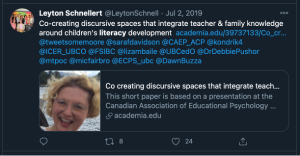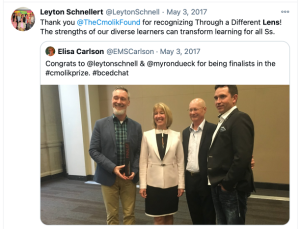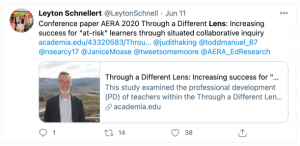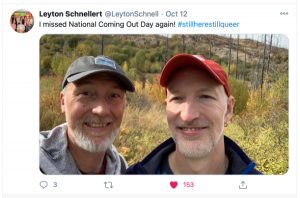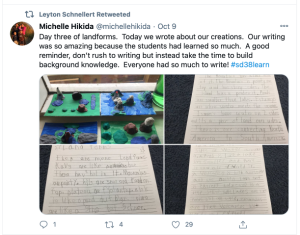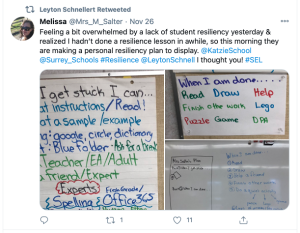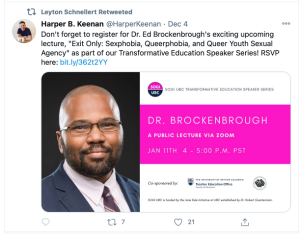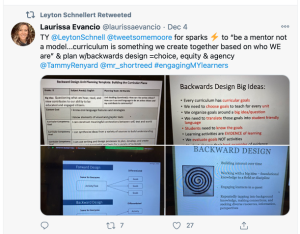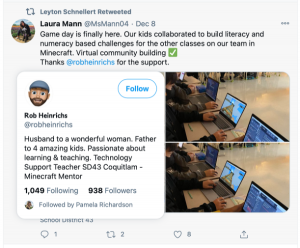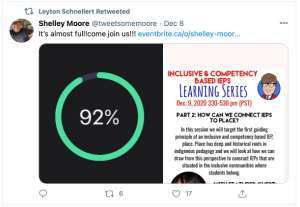Topic 6: Prescriptive vs Holistic Technologies
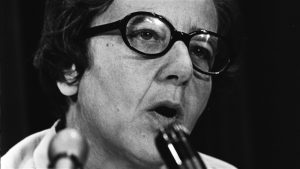
“It is my view that today’s real world of technology is planned and run on the basis of a production model that is no longer appropriate for the tasks we want to undertake. Any critique or assessment of the real world of technology should therefore involve serious questioning of the underlying structures of our models, and through them, of our thoughts”.(Franklin,p.26)
Prescriptive and Holistic Educational Technologies
and the Magic of Audio
by Christopher Spanis
Based on:
Ursula Franklin (1989) The Real World of Technology, part 1
Ursula Franklin (1989) The Real World of Technology. House of Anansi Press
Illich, ABC: The Alphabetization of the Popular Mind, ch 2
What is it like listening in to this lecture from 30 years ago in this elite educational setting? Describe the kind of “media ecology” this lecture created. In what ways is the formal lecture an “educational technology”?
Franklin delivered her lecture in what was then still a male dominated world. Her arguments of inherent maleness of technologies and professions and gender inaccessibility necessitated by it reverberate through the room. Thinking of the lecture itself as an educational technology, Franklin’s definition of technology as practice and system (more than artifacts), and her insistence that we ask not “what” but “how,” Franklin’s Massey lecture is a powerful unpacking of assumptions and structures we (and the audience) take for granted. In this way it reminded me of McLuhan’s “the media is the message.”
The lecture opened up, for me at least, media ecology to the point that everything is in play; “technology has built the house in which we all live,” as Franklin states in her opening. We shape and inescapably are shaped by the world, and the near infinite complexity and inter-and-intra-connectedness of its components and its inhabitants make up this whole media ecosystem. It’s an intimidating thought. It explodes the concept of context – that nothing can be understood in a vacuum, but as a science-minded individual I have to think that it doesn’t mean we can’t still try to understand everything.
Lecture, as a method of the conveyance of ideas, can be thought of as an educational technology. It is different from conversation, obviously, in that the communication is unidirectional. Ideas are not being co-constructed. The audience does have a role in the lecture, I hypothesize, in a similar way as the phenomenon of social laughter: people laugh more often and more heartily when with others than when alone. The shared experience of watching and listening to a lecture may have a unique effect on the brain compared to other media. Lecture is subtly different from an essay or writing in that the presence of the author or speaker changes the dynamic of criticism, as de Castell and Luke (1983) say of Olson: that students don’t have, or don’t feel they have, the right to criticize text until they belong as members of “the club” at a certain level of authorship. So too lecture audiences may take more care in formulating their criticisms due to social pressures, and the additional option of access to the speaker/author after the lecture is unique to the modality.
How do Franklin’s categories of “prescriptive” and “holistic” technologies from The Real World of Technology apply to educational technologies?
Holistic technologies, in an educational context, would include the practice of teachers with autonomy to “control the process of their own work [and] make situational decisions as the work proceeds,” as Franklin says. The interpretation of curriculum, activities, instructional and assessment methods, and all of the media forms utilized would be under the umbrella of holistic technologies. Prescriptive educational technologies would include, as “designs for compliance” or “specialization by process,” the curriculum itself, institutionally mandated texts, and trainers (as opposed to teachers).
Illich and Sanders’ ABC: How is the ‘memory palace’ a peculiarly “oral” technology?
As a student of biopsychology in my undergraduate studies, I have been aware of the memory palace for some time. I like the idea of the mind palace as a technology, as in a thing that is useful to a purpose, a tool. It is a way of remembering that I’ve never managed to get to work, though to be fair my past efforts were not particularly strong. It is peculiarly oral because it is unnecessary to use with writing, as, especially with computer word processing technology, writing can be paused, checked, and edited. Its effectiveness (and impressiveness) is most apparent in the oral context. I’m aware of people with uncanny mental mathematical calculating abilities who claim to use the memory palace technique; these “stunts” are impressive because they are done without writing, typing, or mechanised calculation – any representation of data or thought process outside of one’s self.
Indeed, Illich’s thesis is upheld by modern neuroscience. Functional magnetic resonance imaging gives us a window into the functioning of the brain, and it seems that memory is reconstructed each time it is recalled. This is why eyewitness testimony is to be distrusted in court. The success of the algorithms by which we reconstruct events give us the illusion of recall, of “bringing that past into the present.”
What differences did you see as you switched from listening to skimming to close reading? Were you able to experience the recorded lecture in any ways differently than when reading the text? Listening takes more “real world” time, so where did spending that extra time get you in terms of understanding? What things did you notice?
Skimming is a technique I find often used in a particular context – that of confirmation. I find I tend to skim only when I already have made my mind up about what the writing is about, and my eyes flick across the page hunting for some useful nugget to pull out as an exemplar to support my confirmation bias.
I absolutely experienced the oral format differently than reading – As a fan of CBC Ideas, the Massey Lectures, podcasts, and a lover of audiobooks myself, I find special value in the format. With no hard evidence to support my claim beyond my own subjective experience and introspective reporting, I can tell you some things about listening:
- I can listen while doing other menial things, like highway driving, household chores (e.g. dish washing, lawn mowing, laundry folding). This makes listening preferable to reading.
- I can allow my mind to wander while listening, often visualizing, daydreaming, or I daresay hallucinating the content of the audio as a movie in my head or stare blankly into space as schemata in my schema filing cabinet are re-filed and shuffled about. My listening takes place in the theatre of my own mind palace. There is a risk that I may be distracted by something external or internal and I will miss something, but often it is no trouble to replay the audio from a known point.
- The speaker gives an inimitable human touch that provides verbal context and assists comprehension and meaning making through intonational relevance-tagging. Everyone has experienced the phenomenon of reading to the end of a passage and having not the faintest idea what was read and having to go back and read it again. When listening, I have the benefit of the tone of the speaker’s voice rising and falling, conveying the relevant terms or anchoring each sentence.
- I find I am less likely to misunderstand a sentence when listening as opposed to reading. I have less time to formulate an argument or criticism while the audio continues, but the human connection (voice) seems to spur that part of my brain on, where with reading I may have as much time as I like to stop and think of arguments, only to find upon continuing the passage or rereading that my argument is either misguided or null due to a misreading.
- Sometimes I can get impatient with listening, as it is occurring in real time. Technology allows us to change the playback speed on some platforms, and indeed I have often played nonfiction videos at 1.5x speed to expedite the information transfer.
Conclusion
Suzanne, I want to thank you for a thought-provoking journey. COVID notwithstanding, I found this course the most challenging yet, and I believe I underestimated the investment required to do well and to learn as much as possible. This course really was so interesting and deserved a better version of me at a better time. Most of all, I really feel the absence of the live interaction of a face-to-face class. The content so much to chew on and it would have been so much better in person with colleagues and you.
When I started this MET journey I did so with the intention of learning and developing my abilities to use technology effectively in my f2f teaching practice, while much of the MET course content has been thematic on distance/online learning. If COVID has taught me anything, it is that for all the innovations in online learning thus far, it still does not hold a candle to in-person INTRAaction. I wish that I had dived more deeply and chew on more of the materials you prepared and plan to do so when other things settle down a bit. I sincerely hope to have a chance to work with you face-to-face. Thanks for your patience and support. The final project presentations made for an impressive and fun evening.
Regards,
Chris Spanis
image credit: https://www.lemoyeu.fr/massey-lectures-the-real-world-of-technology-cbc/
